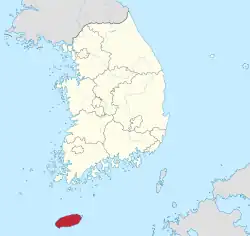Jeju language
The Jeju language (Jeju: 제주말, Jeju-mal) is a Koreanic language spoken on the South Korean island of Jeju. It is related to Korean.
| Jeju language | |
|---|---|
| 제주말 | |
 Jeju Island (red), where the language is spoken | |
| Native to | South Korea |
| Region | Jeju Island |
| Ethnicity | Jeju people |
Native speakers | 5,000 - 10,000 (2010) |
Koreanic
| |
| Language codes | |
| ISO 639-3 | jje |
| ELP | Jejueo |
History
The Jeju language comes from Middle Korean, which is also the ancestor of the Korean language.
Jeju became a separate language from (mainland) Korean due to its isolation as an island and because in 1629, Jejuans were banned from leaving Jeju, causing more disconnection.
Usage
UNESCO lists Jeju as a "critically endangered" language, since most of its speakers are over the age of 70.[1] Younger Jejuans speak Korean instead. As of 2010, the language is spoken by 5,000 - 10,000 people, which is less than 2% of Jeju Island's total population.[1]
Dialect or language
Many linguists think Jeju is its own language, mostly because mainland Koreans cannot understand it.[2] Others think Jeju is a dialect of Korean, although a very different one. The local government calls Jeju as a separate language, and the idea of it being a language is becoming more accepted in both Korean and foreign academia. UNESCO listed Jeju as one of the world's languages in 2011.[2]
Related pages
- Jeju-do, the island where Jeju language is spoken
- South Korea
References
- "UNESCO Atlas of the World's Languages in danger". www.unesco.org. Retrieved 2020-08-16.
- "The Distinct and Separate Language of Jeju Island". Day Translations Blog. 2014-12-29. Retrieved 2020-08-16.